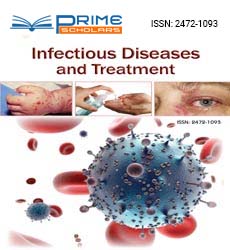Commentary - (2023) Volume 9, Issue 6
COVID-19 Infection and Preeclampsia: Understanding the Potential Connection
Saengchan Senapin*
Department of Pathology, University of Jember, Indonesia
*Correspondence:
Saengchan Senapin,
Department of Pathology, University of Jember,
Indonesia,
Email:
Received: 31-May-2023, Manuscript No. IPJIDT-23-17040;
Editor assigned: 02-Jun-2023, Pre QC No. IPJIDT-23-17040 (PQ);
Reviewed: 16-Jun-2023, QC No. IPJIDT-23-17040;
Revised: 21-Jun-2023, Manuscript No. IPJIDT-23-17040 (R);
Published:
28-Jun-2023, DOI: 10.36648/2472-1093-9.6.56
Description
The COVID-19 pandemic has affected millions of people worldwide,
and its impact on various aspects of health is still being
studied. One area of interest is the potential connection between
COVID-19 infection and preeclampsia, a hypertensive
disorder that occurs during pregnancy. This article explores the
relationship between COVID-19 infection and preeclampsia, the
possible mechanisms involved, and the implications for pregnant
individuals. Emerging evidence suggests that COVID-19
infection may be associated with an increased risk of developing
preeclampsia during pregnancy. Preeclampsia is characterized
by high blood pressure, proteinuria (presence of protein in
urine), and organ damage, typically affecting the kidneys and
liver. Pregnant individuals with preeclampsia may experience
complications such as preterm birth, fetal growth restriction,
and maternal morbidity. Several mechanisms have been proposed
to explain the potential link between COVID-19 infection
and preeclampsia are Systemic Inflammation: COVID-19 infection
triggers a systemic inflammatory response, which can lead
to endothelial dysfunction and damage. Preeclampsia is also
associated with inflammation and endothelial dysfunction, and
the inflammatory response in COVID-19 infection may exacerbate
the risk of preeclampsia. COVID-19 infection can disrupt
immune regulation, leading to an imbalance in the immune
response. Preeclampsia is thought to involve an abnormal
maternal immune response to the placenta. The dysregulated
immune response seen in COVID-19 infection may contribute
to the development of preeclampsia. COVID-19 infection
has been associated with increased risk of blood clotting and
impaired vascular function. Preeclampsia is characterized by
abnormal placental development and impaired blood flow to
the placenta. The vascular and placental dysfunction observed
in COVID-19 infection may contribute to the development of
preeclampsia. The potential connection between COVID-19 infection and preeclampsia has important clinical implications
for pregnant individuals. It highlights the need for close monitoring
of pregnant individuals with COVID-19 infection for signs
of preeclampsia, such as high blood pressure and proteinuria.
Early detection and management of preeclampsia are crucial to
minimize maternal and fetal complications.
Pregnant individuals with COVID-19 infection should receive
appropriate medical care and follow guidelines for managing
COVID-19 during pregnancy. This may include monitoring
for signs of preeclampsia, regular blood pressure checks, and
urine protein testing. Additionally, pregnant individuals should
adhere to infection prevention measures, such as practicing
good hand hygiene, wearing masks, and maintaining physical
distancing. Prevention of COVID-19 infection is essential
in minimizing the potential risk of developing preeclampsia
during pregnancy. Pregnant individuals should follow recommended
guidelines, including vaccination, to reduce the risk of
COVID-19 infection. Vaccination has been shown to be safe and
effective in pregnant individuals and can help protect both the
mother and the developing fetus. Further research is needed
to better understand the relationship between COVID-19 infection
and preeclampsia. Longitudinal studies and larger cohorts
are necessary to establish a clear association and identify
specific risk factors. Future research can also explore potential
preventive strategies and interventions to reduce the risk of
preeclampsia in pregnant individuals with COVID-19 infection.
Acknowledgement
None.
Conflict Of Interest
The author declares there is no conflict of interest in publishing
this article.
Citation: Senapin S (2023) COVID-19 Infection and Preeclampsia: Understanding the Potential Connection. J Infect Dis Treat. 9:56.
Copyright: © 2023 Senapin S. This is an open-access article distributed under the terms of the Creative Commons Attribution
License, which permits unrestricted use, distribution, and reproduction in any medium, provided the original author and source
are credited.
